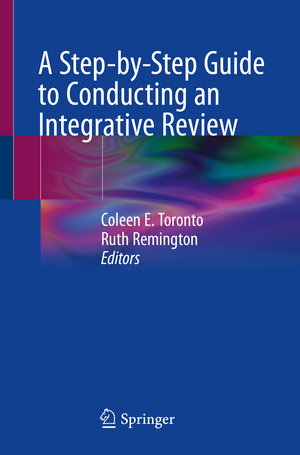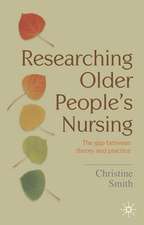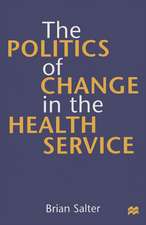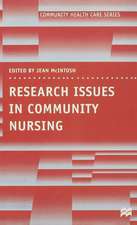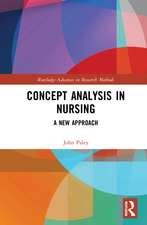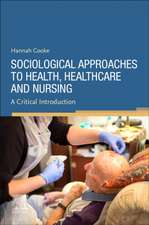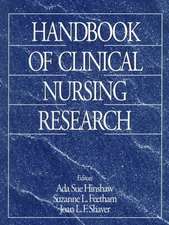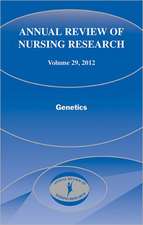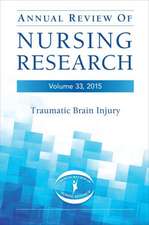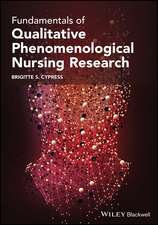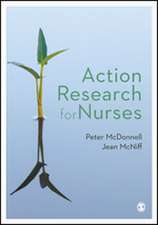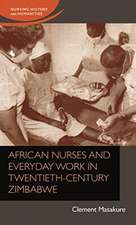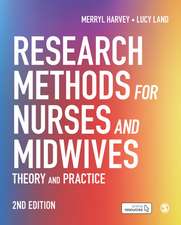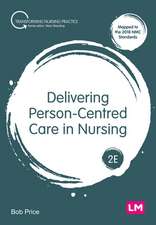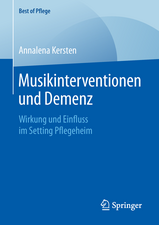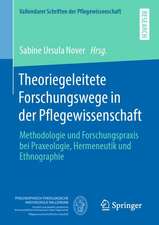A Step-by-Step Guide to Conducting an Integrative Review
Editat de Coleen E. Toronto, Ruth Remingtonen Limba Engleză Paperback – 18 feb 2020
This book provides guidance to readers for how to conduct an integrative review. Over the decades, with the expansion of evidence-based practice (EBP), the evolution of methods used in reviews has resulted in a wide spectrum of review types. Due to the overlapping characteristics of the various review methods, confusion exists related to terminology, descriptions and methods of each type. To fill this gap, this book examines components necessary to conduct a rigorous integrative review from formulating questions through dissemination of the results of the review. Each chapter focuses on one component or step in this process and is written in a straightforward and readable manner. An integrative review is considered by many as an actual research study, hence it should be approached following established research methods involving well‐defined steps. The integrative review is often compared with the systematic review. Both are used in healthcare research and follow a systematic process in reviewing literature and developing recommendations, but there are important differences that are addressed in the book. Evidence-based practice (EBP) demands high quality, rigorous evidence for nurse clinicians to make informed decisions with and for their patients. In nursing education, the integrative review is a frequent capstone project for graduate students and forms the basis for many doctoral projects. The Integrative review process should be valid, reliable and transparent and this book provides clear guidelines for writing an integrative review for students, educators, clinicians, and researchers. This book is a useful addition to courses for both undergraduate and graduate level writers of integrative reviews. In academia, a likely adoption would be in graduate research and research methods courses, and baccalaureate honor courses.
Preț: 302.09 lei
Preț vechi: 317.98 lei
-5% Nou
Puncte Express: 453
Preț estimativ în valută:
57.80€ • 60.36$ • 47.73£
57.80€ • 60.36$ • 47.73£
Carte disponibilă
Livrare economică 25 martie-08 aprilie
Livrare express 08-14 martie pentru 24.43 lei
Preluare comenzi: 021 569.72.76
Specificații
ISBN-13: 9783030375034
ISBN-10: 303037503X
Pagini: 106
Ilustrații: XII, 106 p. 11 illus., 8 illus. in color.
Dimensiuni: 155 x 235 x 14 mm
Greutate: 0.23 kg
Ediția:1st ed. 2020
Editura: Springer International Publishing
Colecția Springer
Locul publicării:Cham, Switzerland
ISBN-10: 303037503X
Pagini: 106
Ilustrații: XII, 106 p. 11 illus., 8 illus. in color.
Dimensiuni: 155 x 235 x 14 mm
Greutate: 0.23 kg
Ediția:1st ed. 2020
Editura: Springer International Publishing
Colecția Springer
Locul publicării:Cham, Switzerland
Cuprins
Overview of the Integrative Review.- Formulating Review Questions.- Searching Systematically and Comprehensively.- Quality Appraisal.- Analysis and Synthesis.- Discussion and Conclusion.- Dissemination.
Recenzii
Notă biografică
Coleen Toronto, PhD, RN, CNE, is an Associate Professor in the School of Nursing at Curry College, USA. Dr. Toronto is a BSN graduate of Northeastern University, received her master’s in nursing education from Framingham State University, and her PhD in nursing from University of Massachusetts Dartmouth. Dr. Toronto is a Certified Nurse Educator (CNE). Her research interests include integrative review methodology, nursing education, health literacy and Delphi methodology.
Ruth Remington, PhD, RN, is a Professor of Nursing at Framingham State University, USA. She received her BS in nursing from Rutgers University and her MS and PhD from the University of Massachusetts Amherst and Worcester. She is a nurse practitioner with extensive experience in the care of the older adult. Her research interests include integrative review methodology, non-pharmacological interventions to manage the symptoms of dementia, and nutrition and cognition.
Ruth Remington, PhD, RN, is a Professor of Nursing at Framingham State University, USA. She received her BS in nursing from Rutgers University and her MS and PhD from the University of Massachusetts Amherst and Worcester. She is a nurse practitioner with extensive experience in the care of the older adult. Her research interests include integrative review methodology, non-pharmacological interventions to manage the symptoms of dementia, and nutrition and cognition.
Textul de pe ultima copertă
This book provides guidance to readers for how to conduct an integrative review. Over the decades, with the expansion of evidence-based practice (EBP), the evolution of methods used in reviews has resulted in a wide spectrum of review types. Due to the overlapping characteristics of the various review methods, confusion exists related to terminology, descriptions and methods of each type. To fill this gap, this book examines components necessary to conduct a rigorous integrative review from formulating questions through dissemination of the results of the review. Each chapter focuses on one component or step in this process and is written in a straightforward and readable manner. An integrative review is considered by many as an actual research study, hence it should be approached following established research methods involving well‐defined steps. The integrative review is often compared with the systematic review. Both are used in healthcare research and follow a systematic process in reviewing literature and developing recommendations, but there are important differences that are addressed in the book. Evidence-based practice (EBP) demands high quality, rigorous evidence for nurse clinicians to make informed decisions with and for their patients. In nursing education, the integrative review is a frequent capstone project for graduate students and forms the basis for many doctoral projects. The Integrative review process should be valid, reliable and transparent and this book provides clear guidelines for writing an integrative review for students, educators, clinicians, and researchers. This book is a useful addition to courses for both undergraduate and graduate level writers of integrative reviews. In academia, a likely adoption would be in graduate research and research methods courses, and baccalaureate honor courses.
Caracteristici
Defines the key features that distinguish the integrative review from other types of literature reviews Guides the reader through the complete process of conducting the integrative review Promotes valid and reliable integrative reviews that support evidence-base nursing practice Offers clear, and practical step-by-step instructions Makes connections to published nursing research Appropriate for any nurse author of an integrative review, student, clinician, academic or researcher
